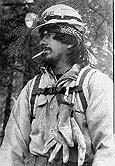- 8 Ways to Increase Dopamine Naturally
- 7 Best Breads for Maintaining Stable Blood Sugar
- Gelatin vs. Collagen: Which is Best for Skin, Nails, and Joints?
- The Long-Term Effects of Daily Turmeric Supplements on Liver Health
- Could Your Grocery Store Meat Be Causing Recurring UTIs?
- Are You Making This Expensive Thermostat Error This Winter?
- Recognizing the Signs of Hypothyroidism
- 10 Strategies to Overcome Insomnia
- Could Artificial Sweeteners Be Aging the Brain Faster?
- Techniques for Soothing Your Nervous System
Gaps in Smoke-Free Workplace Laws May Leave Many Exposed


MONDAY, Nov. 4State laws have reduced the overall rates of secondhand-smoke exposure for many workers, but people in certain occupations are still vulnerable, according to a new study.
Researchers looked at worker exposure to secondhand smoke in Massachusetts after the state implemented its Smoke-Free Workplace Law in 2004. They found that the overall percentage of people exposed fell from 8 percent in 2003 to 5.4 percent in 2010.
However, the investigators found that workers in three job categories still had much higher rates of exposure to secondhand smoke in 2010: installation, repair and maintenance (about 37 percent); construction and extraction (nearly 23 percent); and transportation and material moving industries (almost 20 percent).
These three occupational groups often work in settings not covered by the law — such as outdoor space or private homes — or in which the law is difficult to enforce, such as vehicles, the study authors pointed out.
Exposure to secondhand smoke at work was more common among male, non-white and younger workers, according to the study, which is scheduled for presentation Monday at the annual meeting of the American Public Health Association in Boston.
“We’re seeing a steady decline in prevalence of exposure, but it’s clear that there are still specific groups of workers that deserve our attention,” lead researcher Kathleen Fitzsimmons said in an association news release.
“Findings like these that combine information about occupation and environmental tobacco smoke provide helpful information for evaluating comprehensive, statewide smoke-free workplace laws and for targeting interventions to reduce risks,” added Fitzsimmons, who is an epidemiologist in the Occupational Health Surveillance Program at the Massachusetts Department of Public Health in Boston.
The data and conclusions of research presented at medical meetings should be viewed as preliminary until published in a peer-reviewed journal.
More information
The American Cancer Society has more about the dangers of secondhand smoke.
Source: HealthDay
Copyright © 2026 HealthDay. All rights reserved.










